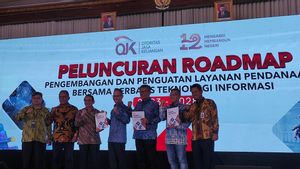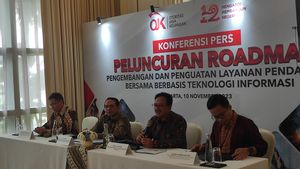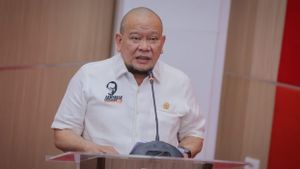JAKARTA - The Financial Services Authority (OJK) said it would limit the public from only borrowing on 3 platforms and tightening supervision on Fintech P2P Lending services aka online loans (pinjol).
Meanwhile, this is stated in the OJK circular letter or SEOJK No.19/SEOJK.06/2023 concerning the Implementation of Information Technology-Based Joint Funding Services (LPBBTI).
Chief Executive of the Supervision of Financing Institutions, Ventura Capital Companies, Micro Financial Institutions and Other Financial Services Institutions (PVML) OJK Agusman conveyed that this rule was issued to create a safer ecosystem for the community and limit accessable sources of loans. So that there will no longer be a hole-closed excavation practice.
"To fence off the behavior of the (consumers) who dig the hole cover, we can only expect a maximum of 3 platforms in the future. Because if there are more and more platforms, there is a real opportunity to dig the hole cover," he explained at a press conference at Hotel Four Seasons, Friday, November 10.
Agusman emphasized that the lender service providers should analyze requests for loan funds such as the feasibility and ability of consumers.
"So don't let what we said earlier seem like they don't have financial capacity, so when they pay they can't afford it," he said.
According to Agusman, the regulation is to prevent the practice of providing excessive funds to borrowers. So that creditors need to check consumer abilities in order to avoid default.
"Indeed, the peer-to-peer lending industry is developing a Pusdafil (Fintech Lending Data Center), and this is in process, hopefully 2024 can be completed, and can connect with SLIK," he said.
Agusman said that in terms of creditors, it is necessary to consider other aspects such as capital, economic prospects, and collateral objects.
VOIR éGALEMENT:
He added that one indicator that can be considered in the ability to pay the auction using a salary, where in early 2024 the borrower can only apply for a maximum loan of 50 percent of his salary and will continue to decline gradually.
"In SE there is a maximum limit related to leverage. So if people have an income, how much can it be borrowed, so there is a maximum. We start from 50 percent in 2024, the following year it will be reduced again to 40 percent, then the following year it will decrease again by 30 percent," he said.
Agusman emphasized that the regulation was enforced with good intentions to protect consumers in accessing funding.
The English, Chinese, Japanese, Arabic, and French versions are automatically generated by the AI. So there may still be inaccuracies in translating, please always see Indonesian as our main language. (system supported by DigitalSiber.id)












